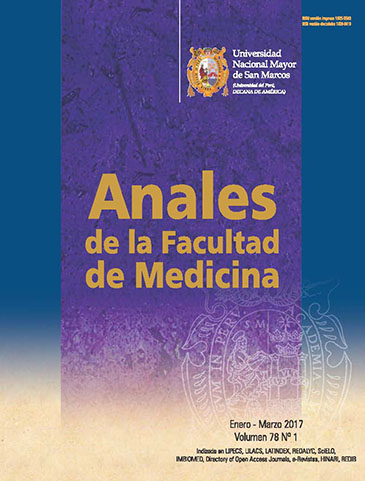Approaches on learning and academic performance of first year medical students at Universidad Nacional Mayor de San Marcos
DOI:
https://doi.org/10.15381/anales.v78i1.13021Keywords:
Learning Approaches, ASSIST Inventory, Medical students, Academic Performance.Abstract
Introduction: Every year thousands of medical students face the challenge of overcoming academic subjects to acquire skills for their professional activities. The success of the student’s life on the way to the profession depends on many factors including learning approaches. Objective: To determine the predominant learning approaches in the first year medical students and their relationship to academic achievement. Design: Observational, descriptive, quantitative study. Institution: Faculty of Medicine, Universidad Nacional Mayor de San Marcos, Lima, Peru. Participants: Medical students. Interventions: The short version of the questionnaire Approaches and Study Skills Inventory for Students (ASSIST) was applied to 130 first year medical students enrolled in the Cellular and Molecular Biology subject; the relationship of learning approaches with academic performance was evaluated. The association of the subscales was assessed by factorial analysis and the internal consistency by Cronbach's alpha analysis. The relationship of each approach to learning and academic performance was evaluated by regression analysis. The effect of age, gender and their interactions with each learning approach were evaluated by a two-way ANOVA. Main outcome measures: Deep, strategic and superficial learning approaches score. Results: The total score for deep, strategic and superficial learning approaches were 22.4, 20.4, and 15.4 respectively. There was significant correlation between theoretical examination scores and strategic approach (p = 0.004). No differences in relation to age and sex were found. Conclusions: The deep approach was predominant in San Marcos first year medical students. There was high significant correlation between the theoretical examinations and the strategic approach.Downloads
Published
2017-05-16
Issue
Section
Artículo Original
License
Copyright (c) 2017 Heli Jaime Barrón Pastor, Yesica Llimpe Mitma de Barrón

This work is licensed under a Creative Commons Attribution-NonCommercial-ShareAlike 4.0 International License.
Those authors who have publications with this magazine accept the following terms:
- Authors will retain their copyrights and guarantee the journal the right of first publication of their work, which will be simultaneously subject to Creative Commons Attribution License that allows third parties to share the work as long as its author and its first publication this magazine are indicated.
- Authors may adopt other non-exclusive licensing agreements for the distribution of the version of the published work (eg, deposit it in an institutional electronic file or publish it in a monographic volume) provided that the initial publication in this magazine is indicated.
- Authors are allowed and recommended to disseminate their work over the Internet (eg: in institutional telematic archives or on their website) before and during the submission process, which It can produce interesting exchanges and increase quotes from the published work. (See El efecto del acceso abierto ).
How to Cite
1.
Barrón Pastor HJ, Mitma de Barrón YL. Approaches on learning and academic performance of first year medical students at Universidad Nacional Mayor de San Marcos. An Fac med [Internet]. 2017 May 16 [cited 2024 Jul. 17];78(1):49-54. Available from: https://revistasinvestigacion.unmsm.edu.pe/index.php/anales/article/view/13021















